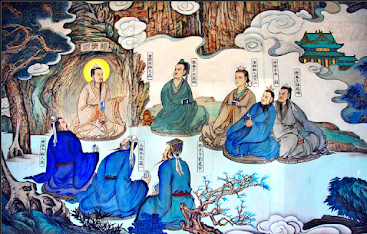The Philosophy of Flow
"That which offers no resistance, overcomes the hardest substances. That which offers no resistance can enter where there is no space. Few in the world can comprehend the teaching without words, or understand the value of non-action."- Lao Tzu, Tao Te Ching, Chapter 43.
Taoism
Tao Te Ching, was created by Lao Tzu, which is the main work of Taoism. A well-known concept that has emerged from Taoist philosophy is Wu Wei, that can be translated as "non-action, "effortless action", or the paradoxical "action of non-action.
In a practical sense, we can describe Wu Wei as the state of flow, often referred to as "The Zone".
Now, what is "The Zone"?
The state when we engage in action without striving, and move through time and space almost effortlessly. There are no extremes, no worries, no ruminations, everything seems to flow in a natural course.
Back to Taoism
The essence of Taoist philosophy is living in harmony with the "Tao", also called the "Way". What is the "Tao"? We don't really know what it is, and it's futile to try asking about it. Our understanding of the Tao only goes as far as the limitations of our perception. What the "Tao" really is and what it looks, still remains a mystery.
Moreover, the Tao we speak of isn't the real Tao, according to Lao Tzu. Hence, the famous opening of Tao Te Ching goes like this:
"The Tao that can be described is not the eternal Tao. The name that can be spoken is not the eternal Name"- Lao Tzu, Tao Te Ching, Chapter 1.
How do We Live with the "Way"?
Taoist literature doesn't give one practical method to achieve this. However, we can find many clues that point to achieving stillness of mind, curbing the senses, being humble, and the cessation of striving, in order to open up ourselves up to the workings of the universe.
The Taoists observe that stillness of mind can be combined with action, and if we are completely in the present moment, our actions will go effortlessly, without friction and accompanied by razor sharp focus.
"It was almost as if we were playing in slow motion. During those spells, I could almost sense how the next play would develop and where the next shot would be taken."- Bill Russell, Second Wind.
The Power of Gentleness
By forcing and striving, we might get the job done, but at the same time we spend much more energy than necessary and possibly suffer from collateral damage. On the other hand, someone in a state of flow approaches a task intelligently, knowing when to act and when not to, and finds a balance between action and non-action.
It's a matter of not too hot, not too cold. It's the golden path between anxiety and boredom. We are encouraged to be ambitious, to take control and to strive. Meanwhile many people suffer from depression, anxiety disorders, and sleep disorders.
Are we burning ourselves out? We look down on passivity, and often mistake it for laziness. But these are different things. When we look at nature, "doing nothing" makes way more sense than we tend to think. Results do not equal the amount of energy we spend. Results are the consequence of a series of actions.
How does Taoism Pictures Itself?
Taoism compares life to a river. The river already has a course or several courses, and once we find ourselves in that river, we can swim against the current, we can hold on to a branch or we can let go and go along with the stream.
Most of our lives, we swim against the current and we don't even realize it. Our mind believes that it can and should control the environment, in order to survive, which is kind of egocentric because the vast majority of processes which as well as outside ourselves are not in our control. When we flow along with the current, we align ourselves with this natural course. This is the path of least resistance, it gives nature a chance to unfold, without us resisting it.
Another aspect of the river that characterizes Taoism, is the water itself. The characteristics of water are softness and humility that basically symbolize Taoist virtue.
"The supreme good is like water, which benefits all of creation without trying to compete with it. It gathers in unpopular places. Thus it is like the Tao"- Lao Tzu, Tao Te Ching, Chapter 8.
Water may be soft, but it overcomes hardness which we can see in the erosion of rock. And water not only seeks the lower places, it also has no purpose, no goal, no specific desire. Yet, it nourishes everything that it passes. It's an incredible life force, that literally does God's work, but without any ambition.
"Water is the softest and most yielding substance. Yet nothing is better than water, for overcoming the hard and rigid, because nothing can compete with it."- Lao Tzu, Tao Te Ching, Chapter 78.
What We've learned
Instead of worrying about the future, focusing on what's in the present. No matter if you're completely immersed in sports, writing, a video game, or dancing. When you're in a state of flow, you forget the results, the pressure, the anxieties about the future, the failings at the past. It's just you, and the task at hand. You're completely in the present. And the only way to do this, is by letting go.
Letting go means stop swimming against the current, stop holding on to some branches. It means letting go of the past, letting go of the future, focus on this moment entirely, and just live it, without hesitation.
most information are taken from https://www.youtube.com/watch?v=JtGtqmC5wU4&t=132s
Yes, I did summarize the whole thing and I didn't copy any words from other websites.



















0 comments:
Post a Comment